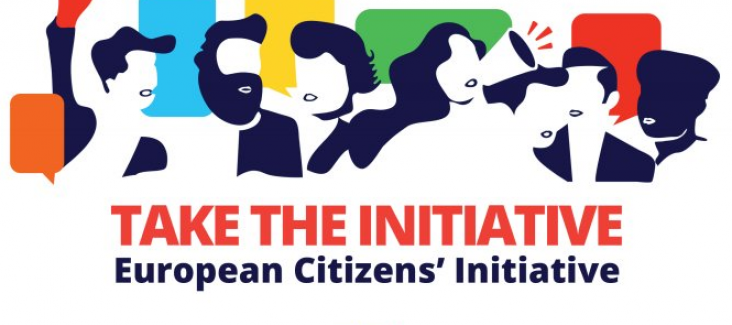The founding fathers of the European Union did not like the idea of including citizens directly in decision-making processes at the transnational political level. This was less due to the experience of the Second World War than to the growing threat of the Cold War, which initially spoiled the ideas for a democratic European Federation that were brewing in the 1940's. As a result of this, the integration process of the 1950's was dominated by economic and bureaucratic considerations: Jean Monnet's system did not provide for direct civilian participation in decision-making. It wasn’t until the beginning of the 60’s that another Frenchman, President Charles de Gaulle first formulated the challenge of a Europe-wide referendum: "Europe will be born on the day on which the different peoples fundamentally decide to join. It will not suffice for members of parliaments to vote for ratification. It will require popular votes, preferably held on the same day in all the countries concerned"
It would take another decade for de Gaulle's successor, Georges Pompidou, to make a start and make the citizens of his country the first Europeans to take part in a popular vote on Europe: on 23 March 1972, a two-thirds majority voted in favour of extending the then European Community northwards to include Denmark, Great Britain, Ireland and Norway.
In retrospect, this decision did not only open the door to the north, but also to more (direct) democracy in Europe. Since then, more than 60 nationwide popular votes have been held on Europe in Europe, making the European integration process the single most voted on issue in a global context. However, all of these votes have been held in a national context. A transnational popular vote process has not been put in place and this makes constitutional referendums like the recent Irish ones on the Lisbon Treaty rather problematic with respect to equal voting rights across the EU. While the European citizens today still cannot make decisions on a transnational level, the European Treaties have introduced the right for them to at least set the political agenda through the European Citizens’ Initiative (ECI).
Early proposals for an ECI
The first proposals for a transnational instrument were made more than 30 years ago, during the last moments of the cold war. Since then, the European Parliament and the European Commission have repeatedly expressed support for the introduction of direct-democratic elements at the European level in a series of resolutions.
However, in the early days of democratizing Europe those resolutions were often vaguely formulated as: "a parallel strategy to allow the popular will to express itself (...) by popular initiative referendum," and the introduction of EU-wide popular consultations/opinion polls. In December 1993, the Public Liberty and Domestic Affairs Committee expressed its support for the introduction of a "European legislative referendum", as well as the possibility of citizens’ ballots on "community decisions". Such impulses from the European Parliament helped to ensure that in the run-up to and during the Amsterdam governmental conference in the mid 1990s, the possibility of introducing a formal right of submission for EU citizens was on the table.
The then foreign ministers of both Austria (Schüssel) and Italy (Dini) proposed that 10% of the citizens in Europe (with signatures from at least three countries) could present a submission to the European Parliament, that then would be obliged to consider it. This proposal, which was not backed at the governmental conference, did not provide for a subsequent popular vote. However, the idea was later taken up by the Parliament’s Petition Committee, which tried to upgrade the petition right to a full-fledged right of submission.
The eurotopia-momentum
After the dramatic changes of 1989 in Europe, civil society activists, journalists and scholars began to show more interest in the subject of transnational direct democracy. At more than 20 European meetings over 10 years, the European network organisation eurotopia, founded in 1991 in Rostock, developed methods for involving citizens in a European constitutional process, as well as the first elements of direct democracy in such a constitution. The appointment of a European Convention was initially proposed in the mid-90’s. A "double qualified majority" was proposed for the founding referendum on a European constitution: "The Constitution must be accepted not only by a majority of all EU citizens, but also by a majority of citizens in 4/5 of all EU member states". From 1994 onwards, in the run-up to the Amsterdam governmental conference, numerous European NGOs formed a European network under the name of Inter-Citizens Conferences (ICC): in the so-called "Loccum Declaration", they formulated a set of democratic requirements for a European Charter of Citizens' Rights. This included for the first time the right of submission to the European Parliament.
The Germany-based activist network “Mehr Demokratie” (More Democracy) started to develop a European strategy and concrete proposals. A comprehensive set of initiative and referendum tools was elaborated, including a multi-stage right of initiative and an obligatory referendum for alterations to treaties. The draft proposals emphasised that a “constitution is not a prerequisite for the establishment of direct-democratic rights in the EU”.
Together with the Dini/Schüssel-initiative proposal, the various civic contributions paved the way for a debate inside the Convention on the Future of Europe, which was established in February 2002. After half a century of European integration, this body replaced the secret diplomacy between states, bringing for the very first time an air of transparency and parliamentarian majority into European Treaty/Constitution-making. Indeed, the Convention assembly offered the possibility for everyone to follow the discussions. Or at least in part, since the powerful presidium, with Valéry Giscard d’Estaing as a chairman, did not meet in public.
The breakthrough of 2003
A whole package of democracy proposals were launched at the Convention, including amendments by Alain Lamassoure (EPP-ED, France), Johannes Voggenhuber (Green/EFA-Austria), Josep Borell Fontelles (PES - Spain), Sylvia-Yvonne Kaufmann (GUE – Germany), Casper Einem (PES – Austria) and Jürgen Meyer (PES – Germany). Finally, the Meyer proposal, signed by 77 members of the Convention, and launched as I-46, part I, title VI (CONV 724/03) on June 12, managed to break down the last resistance in the Convention presidium and contributed to a late and welcome breakthrough. This last draft amendment was the foundation for the final text of the constitution, presented by the Convention Chairman Giscard on June 13. For the very first time in history citizens were to get the right to be involved in setting the political agenda beyond national borders.
It would take another nine years to finally adopt a new Treaty (by 2009) and an ECI regulation to finally and formally allow more than 500 million citizens across 28 member states to take action. On April 1, 2012 a new era started. Since then, 67 ECIs have been filed with the European Union. 19 were rejected on legal grounds by the Commission. 48 initiatives were registered. 23 missed the target of one million signatures within 12 months, while seven initiatives have been withdrawn by the organisers themselves. 7 ECIs are currently gathering signatures and 4 have managed to fulfil all the necessary requirements (The Minority SafePack Initiative has recently gained 1 million signatures and would constitute a fifth, but it still needs to be reviewed by the member states and the Commission). None of them have been fully implemented.
These numbers display a very clear message: The possibilities for direct democracy in the European Union remain very small. In order to succeed, this will need to change. Soon.
*Bruno Kaufmann is a Board member of Democracy International and Global Democracy Correspondent for the Swiss Broadcasting Company. He was a co-founder of the eurotopia-network in 1991, which developed the first ideas for a European Citizens’ Initiative.


